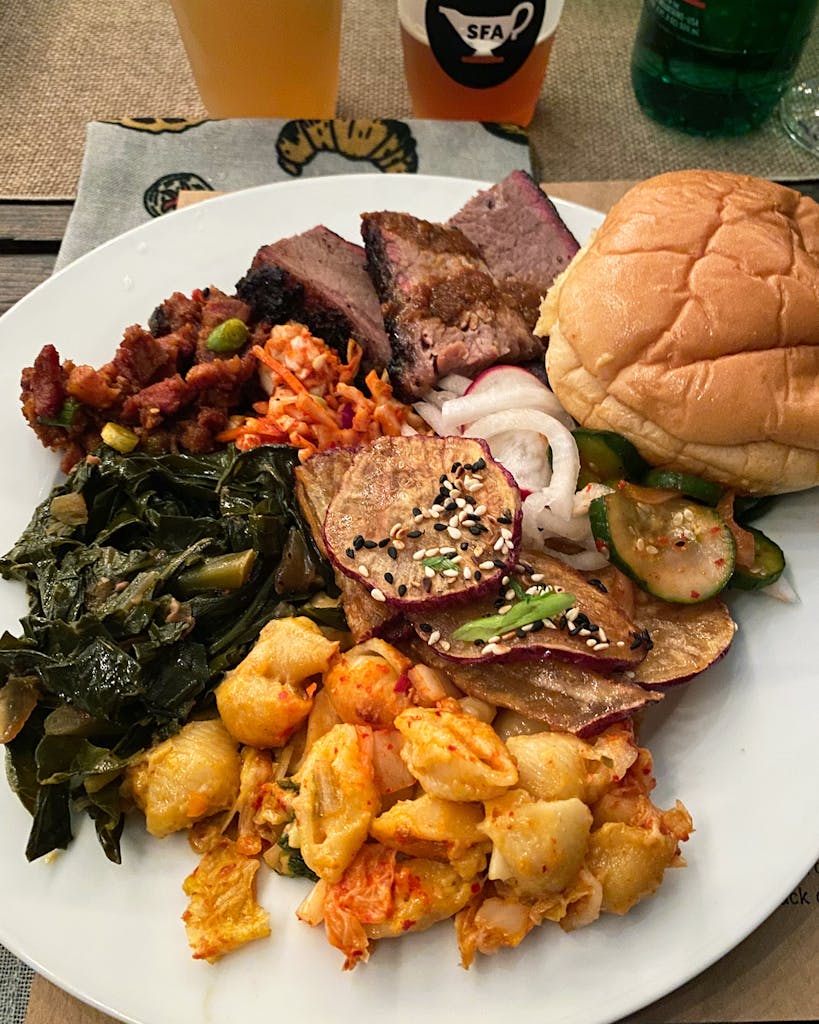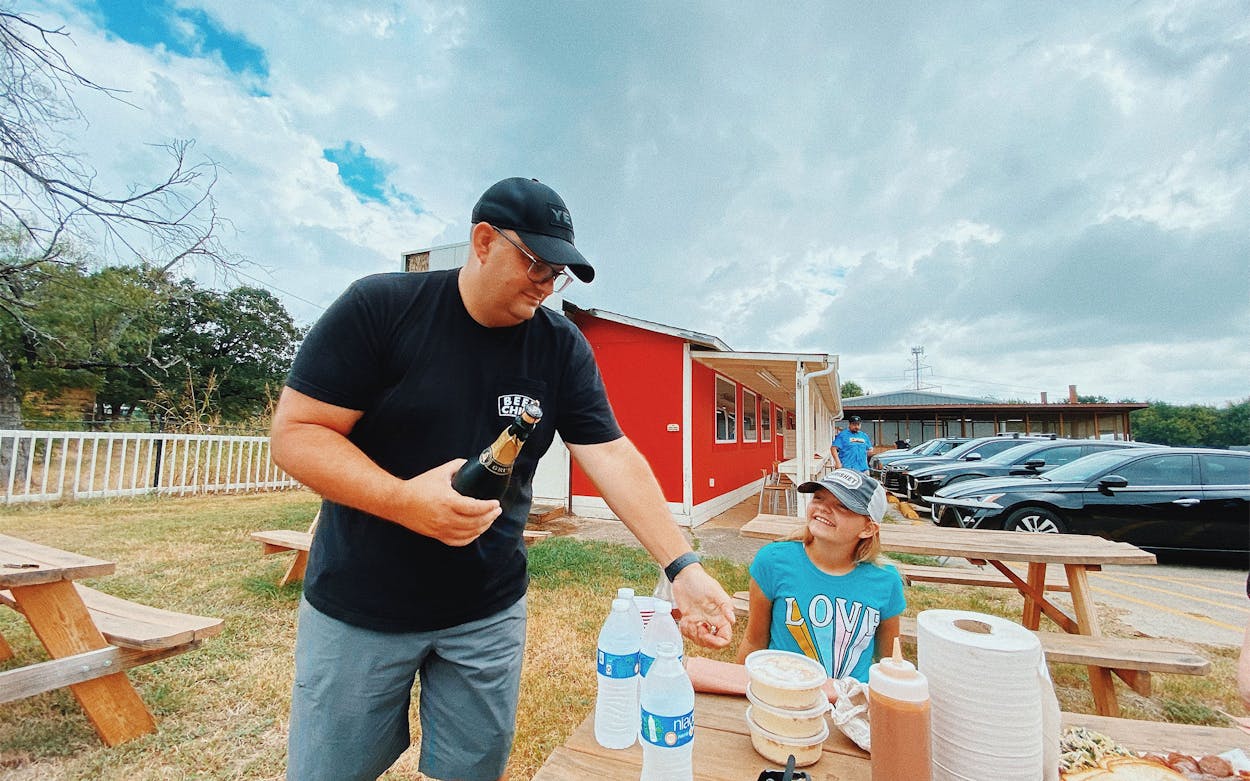Members of the Southern Foodways Alliance (SFA) gather every October for an annual symposium on the University of Mississippi campus in Oxford, Mississippi. Each year, a theme is chosen to inform the presentations, the discussions, and the food served. This year’s theme was barbecue, just as it had been in 2012, when I attended my first symposium. Back then, I was an enthusiastic paying attendee and Mississippi still had the Confederate battle cross on its state flag. This time, the new magnolia flag was flying as I drove across the Mississippi River. I was there to present some of what I’ve learned about barbecue in the last decade, and to share how inspiring the 2012 symposium had been for my current work.
In 2012, I attended the event as an architect in the midst of writing a barbecue book, which became The Prophets of Smoked Meat, published the following year. I drove in early, still wearing the khakis and collared shirt from my day job, and introduced myself as an architect from Dallas. The SFA, as part of Ole Miss’s Center for the Study of Southern Culture, “documents, studies, and explores the diverse food cultures of the changing American South,” per the organization’s mission statement. So, by day two, I realized this crowd would be a lot more interested in talking with me if I had introduced myself as a food writer.
Taking in the knowledge, humor, and wisdom of authors like the late John Egerton, Lolis Eric Elie, Gustavo Arellano, and then–SFA director John T. Edge had a profound affect on how I imagined my future. I called Texas Monthly‘s editor in chief at the time, Jake Silverstein, during my drive back home and suggested he should hire me to write about barbecue full time. Six months later, I gave up my position as an architect and signed a contract with Texas Monthly to become the country’s only barbecue editor. That symposium changed my life.
I didn’t expect this past weekend to be as personally profound, but it did give me a chance to reflect on my work, the work of my peers, and how much barbecue has changed since 2012. My first bite of barbecue from that long-ago weekend was from a whole hog prepared by Rodney Scott, who had gained fame in the food world a few years prior thanks to a New York Times profile, written by Edge, about Scott’s Variety Store & Bar-B-Q in Hemingway, South Carolina. It remains the finest bite of whole hog in my memory. Since then, Scott has left his family’s restaurant in Hemingway and opened his own chain, Rodney Scott’s BBQ, with five locations in South Carolina, Alabama, and Georgia, and another in Nashville on the way. Scott won the James Beard Award for Best Chef: Southeast in 2018, becoming only the second pitmaster to win the award. (Aaron Franklin was the first, in 2015.)
Rodney Scott wasn’t in attendance this past weekend, but my friend Angie Mosier was. She’s the director of marketing for Pihakis Restaurant Group, which owns Rodney Scott’s BBQ. She shared the struggles they are undergoing to convince new customers in their ever-expanding market to give Scott’s signature sauce a chance. It seems the spicy, vinegar-based sauce from the Pee Dee region of South Carolina doesn’t have wide appeal, and folks are reaching toward the sweeter, tomato-based sauce that’s more familiar. The farther Rodney Scott’s BBQ gets from its home state, Mosier said, the more important it is to highlight the traditional ingredients that make South Carolina whole hog barbecue, including the sauce.
My presentation about how Texas brisket has conquered the barbecue world echoed Mosier’s concerns. (The full text of my presentation will be published in a future issue of the SFA’s quarterly magazine, Gravy.) I displayed overhead shots of barbecue trays packed with sliced brisket, sausages, brussels sprouts, and broccoli salad to demonstrate the influence of Texas barbecue across the country. This modern form of our cuisine has resulted in the easiest access we’ve ever had to great barbecue—but also a sameness. We’re witnessing the slow death of barbecue regionalism, but I shared my hope that individuality will reemerge in a new form when barbecue joints emphasize place once again.
Seeing the dominance of those trays in my presentation took me back to a conversation with Bon Appétit restaurants editor Andrew Knowlton about Franklin Barbecue during an SFA cocktail hour in 2012. He had recently declared the Austin joint, with its signature turquoise trays, the best in the country, and I was giddy that Texas barbecue could tout such lofty accolades. In 2002, a New York Times report from that year’s SFA symposium (also with a barbecue theme) quoted an anonymous attendee’s Texas barbecue joke: “They only use beef because you can’t lasso a pig.” A decade later, Franklin had only begun its ascendance, and last weekend, I explained to a few hundred barbecue fiends that Franklin Barbecue had become the most influential joint in the world. On Sunday, I visited the newest barbecue spot in Oxford. The slices of brisket served on a tray lined with butcher paper seemed to prove my point, even if the brisket was terribly dry. A poor replica is still a replica.
I didn’t expect to still be craving barbecue at the conclusion of the symposium, but there weren’t the heavy helpings of smoked meat we indulged in last time. In 2012, we passed a bottle of Jack Daniel’s between the seats of the bus that took us to a field for a meal of smoked chicken with Alabama white sauce by Pat Martin, a whole hog from Samuel Jones of Skylight Inn, Brunswick stew by Ed Mitchell, and smoked beef ribs from Tim Byres of the late Smoke restaurant in Dallas. Revelers walked the grounds gnawing on beef rib bones, wielded like edible trophies.

This year, the meals were a thoughtful introduction to the global barbecue future we should expect to see around the country. Heirloom Market BBQ in Atlanta highlighted its Korean influence with kimchi mac and cheese and a variety of banchan to go with smoked brisket and Korean-spiced pork shoulder. The centerpiece for an outdoor lunch was lamb mixiote from San Francisco’s La Cocina, which describes itself as the first women-led food hall in the U.S. Mixiote is a Mexican barbecue preparation I was familiar with thanks to Gustavo Arellano’s SFA presentation in 2012, in which he predicted the dish’s rise in popularity. (His discussion of carne asada and barbacoa this year was equally entertaining.)
Overall, there was less conspicuous consumption of both food and alcohol this year, at least from what I witnessed. That may have been an intentional choice by the SFA, or a result of the presence of the different audience it’s been courting as it tries to shed its bro-culture image.
The SFA and its founder, John T. Edge, were once perennial media darlings. Edge’s charisma is part of what drew me to the SFA, and it led to our continued friendship. The group’s glowing coverage, coupled with barbecue’s rising popularity, sold out the 2012 symposium in twelve minutes (there were 313 total attendees). In 2020, Edge’s long-term leadership came into question, and there were calls for him to step down. That process is underway, with Melissa Booth Hall and Mary Beth Lasseter taking on the roles and titles of codirectors at the SFA. Edge’s title is now founding director, and he has become more of an emeritus figure. Hall and Lasseter planned and ran the last two years of symposia, and it was Lasseter who invited me to come speak. I gladly accepted because I still believe in the mission of the SFA, even if the organization has lost some shine. This year, the event was just shy of a sellout, with 283 attendees.
Slow ticket sales might be evidence of waning enthusiasm for the SFA, or it might be a reflection of barbecue-event saturation. It feels like I could have chosen a different barbecue festival around the world to attend every weekend of the year. Southern Smoke was also held in Houston last weekend, attracting its own fans and pitmaster talent. And, of course, Texas Monthly has its own annual BBQ Fest coming up next weekend.
This year’s SFA symposium also meant new awards. The Ruth Fertel Keeper of the Flame Award (named after the Louisianan founder of Ruth’s Chris Steak House) was given to Fresh Air Barbecue in Jackson, Georgia. It has been smoking fresh hams and serving them with slaw and Brunswick stew since 1929. A decade ago, this same award introduced me to pitmaster Helen Turner, who also specializes in pork sandwiches at Helen’s Bar-B-Que in Brownsville, Tennessee. She was back for an even more prestigious honor. This year, Turner became the only person to ever win both the Keeper of the Flame Award and the Lifetime Achievement Award.
Ruth Fertel’s grandson, Rien Fertel, recorded SFA’s first oral history with Turner in 2008. Crackly portions of that recording were used in a film made about Turner’s work that was screened for attendees. Fertel was in attendance, and he said he was surprised and gratified to hear the audio. We first bonded over barbecue at the 2012 symposium. He and his oral history partner, Denny Culbert (who photographed a whole hog book I cowrote with Samuel Jones), were fresh off the SFA’s Barbecue Bus then. He has since published a book, The One True Barbecue, and received his PhD from my alma mater, Tulane, where he is a professor. Fertel’s most notable transformation, at least to me, is that he has become a vegetarian. He said he was still drawn to a barbecue-themed symposium because he comes to see the people more than the food, though we reminisced about how much we loved chef Ashley Christensen’s all-vegetarian meal, including a showstopping tomato pie, in 2012. Back then, it would have been unthinkable to plan for a vegetarian-barbecue road trip through Texas, but that’s exactly what Fertel and I began scheming this year. We also agreed to travel to the 2032 SFA symposium, if the organization keeps up the barbecue theme every decade.
Having these conversations brought back memories of just how invigorating it felt to leave my cubicle life to enter a world in which everyone seemed to care about my blooming passion of food writing. We all thought we were witnessing a massive transformation in American barbecue in 2012, and we were thankful it was being declared cool again. This year’s programming was less barbecue-centric but still showed its importance. Barbecue is a subject of study all its own, lending credibility to other subjects that have a natural adjacency to barbecue (or enough of one that we can be convinced we’re still discovering things about barbecue). As someone who is only interested in my own work if I’m learning something, I can’t say there was as much new information to take in this time around. But I am happy to report that barbecue scholarship is alive and well, and it’s good to be reminded there’s more knowledge to be gained.
- More About:
- Texas Monthly BBQ Festival
- Franklin Barbecue








